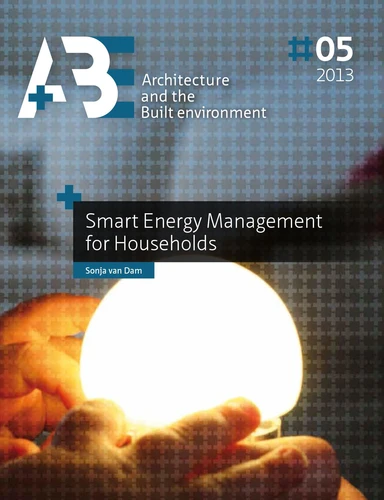Smart Energy Management for Households
Par :Formats :
Disponible dans votre compte client Decitre ou Furet du Nord dès validation de votre commande. Le format Multi-format est :
- Pour les liseuses autres que Vivlio, vous devez utiliser le logiciel Adobe Digital Edition. Non compatible avec la lecture sur les liseuses Kindle, Remarkable et Sony
 , qui est-ce ?
, qui est-ce ?Notre partenaire de plateforme de lecture numérique où vous retrouverez l'ensemble de vos ebooks gratuitement
Pour en savoir plus sur nos ebooks, consultez notre aide en ligne ici
- FormatMulti-format
- ISBN978-94-6186-179-5
- EAN9789461861795
- Date de parution28/06/2013
- Protection num.NC
- Infos supplémentairesMulti-format incluant ePub sans ...
- ÉditeurTU Delft
Résumé
Smart Energy Management for Households infers design-related insights and guidelines to improve the use and effectiveness of home energy management systems (HEMS) through an empirical evaluation of the longitudinal effectiveness of these devices and an exploration of factors that influence their use and effectiveness.
Three case studies executed with three different HEMS in households, a life cycle assessment (LCA) on those three HEMS, as well as a reflection on the challenges of both researching and implementing HEMS in existing housing gave a comprehensive picture of the opportunities and barriers for HEMS.
The research revealed five typical use patterns that emerged amongst households.
It also revealed average energy savings of 7.8%, which however decreased in the follow-up that was conducted, and factors that may influence the use and effectiveness of HEMS. Nonetheless, the LCA calculations divulged that the HEMS can achieve net energy savings when taking their embedded energy into account.
It also revealed average energy savings of 7.8%, which however decreased in the follow-up that was conducted, and factors that may influence the use and effectiveness of HEMS. Nonetheless, the LCA calculations divulged that the HEMS can achieve net energy savings when taking their embedded energy into account.
Smart Energy Management for Households infers design-related insights and guidelines to improve the use and effectiveness of home energy management systems (HEMS) through an empirical evaluation of the longitudinal effectiveness of these devices and an exploration of factors that influence their use and effectiveness.
Three case studies executed with three different HEMS in households, a life cycle assessment (LCA) on those three HEMS, as well as a reflection on the challenges of both researching and implementing HEMS in existing housing gave a comprehensive picture of the opportunities and barriers for HEMS.
The research revealed five typical use patterns that emerged amongst households.
It also revealed average energy savings of 7.8%, which however decreased in the follow-up that was conducted, and factors that may influence the use and effectiveness of HEMS. Nonetheless, the LCA calculations divulged that the HEMS can achieve net energy savings when taking their embedded energy into account.
It also revealed average energy savings of 7.8%, which however decreased in the follow-up that was conducted, and factors that may influence the use and effectiveness of HEMS. Nonetheless, the LCA calculations divulged that the HEMS can achieve net energy savings when taking their embedded energy into account.



